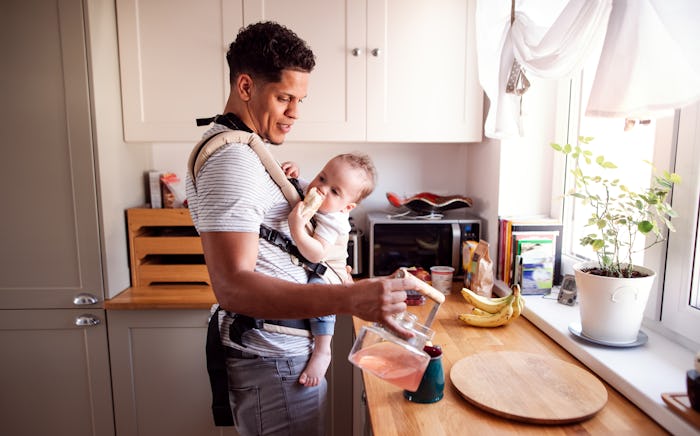Life

A Baby's Connection To Their Father's Scent Is Bigger Than You Think, Experts Say
From hearing their voice from inside the womb for months, to feeling their strong hands holding them in the first few minutes after birth, a baby's early connection with their father creates a priceless relationship that will stay with them throughout their entire life. As your baby grows, they'll be able to easily recognize dad's face through sight, and their voice through hearing, but do babies know their father's scent?
Even though babies will easily recognize their mom thanks to an array of hormones and the sweet smell of breast milk that a newborn can instantly recognize as being meant for them, a baby's ability to recognize their dad is equally as important, although it may take some time to develop. "Babies can definitely smell their mom, especially the milk. After awhile, they can likely identify people by their scent, but it is not an immediate thing," Dr. Gina Posner, a pediatrician with Orange Coast Medical Center in Fountain Valley, California tells Romper. Dr. Posner also adds that right when babies come out, she hasn't heard of "any evidence that they can recognize the scent of the dad," but there are ways that dads can make their scent more familiar to their babies after birth.
Dr. Trung Tristan Truong, a pediatrician with Saddleback Medical Center in Laguna Hills, California, explains how babies are able to pick up their dad's scent during the crucial first few days of life. It is pretty common knowledge that skin-to-skin contact is important for breastfeeding moms, but Dr. Truong tells Romper that this type of connection also impacts a baby's ability to know their father's scent. "A baby who spends a lot of time with a particular caregiver (including fathers) should be able to pick up that caregiver’s scent over time," Dr. Truong says. "The key is consistent skin-to-skin contact."
In addition to skin-to-skin contact, other types of bonding activities also boost a baby's ability to learn their dad's scent and create a strong father-child bond. Dr. Natasha Burgert, a pediatrician practicing in Kansas City, tells Romper that babies can recognize their dad's scent by the third day of life and will be able to tell the difference between different caregivers based on scent, especially if dads participate in hands-on bonding activities and caregiving.
"Evidence suggests that paternal bonding is amplified by caregiving acts. For example, bonding hormones increase in partners during skin-to-skin time in the neonatal period," Dr. Burgert tells Romper. "These bonding hormones are naturally elevated in mothers, which makes moms' bonding process easier. However, partner connection will increase as baby grows during every feeding session, diaper change, and playtime experience. Being a hands-on partner is not only helpful to mom, but beneficial to the partner him/herself."
If dad is given ample opportunities to help with taking care of their baby, they will be able to quickly establish a connection to their dad's scent as dad interacts with their baby. "Having the father feed (if feeding from the bottle), change, rock, talk, snuggle, and/or bathe the baby should help in fostering the father-baby bond quickly," Dr. Truong tells Romper.
Although babies may not be able to recognize their father's scent right out of the womb, they may be able to recognize their dad's voice, according to Dr. Truong. "Babies are suspected to be able to detect voices while in-utero (in the womb) around 32 weeks gestation (7 months gestation), so it’s quite possible that they not only are able to detect mom’s voice but dad’s voice as well, as long as the baby is exposed to the father’s voice consistently while in the womb." So, having dad talk to their baby in the womb may jumpstart their connection and allow for an easier time bonding.
This article was originally published on